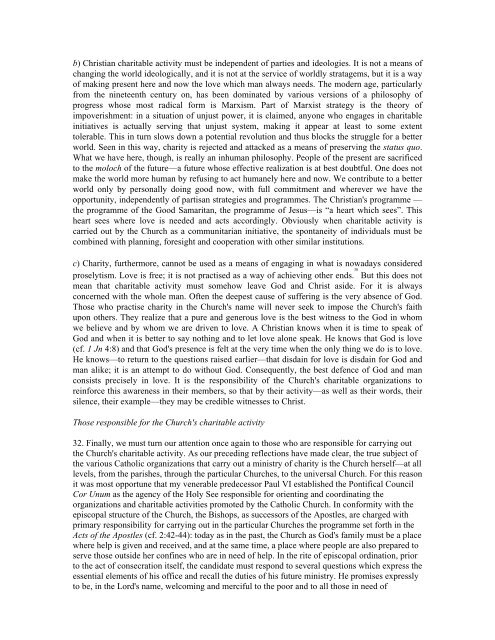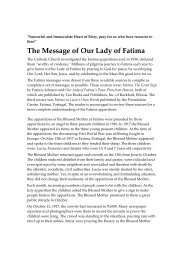God Is Love - Beeldbibliotheek
God Is Love - Beeldbibliotheek
God Is Love - Beeldbibliotheek
- No tags were found...
Create successful ePaper yourself
Turn your PDF publications into a flip-book with our unique Google optimized e-Paper software.
) Christian charitable activity must be independent of parties and ideologies. It is not a means ofchanging the world ideologically, and it is not at the service of worldly stratagems, but it is a wayof making present here and now the love which man always needs. The modern age, particularlyfrom the nineteenth century on, has been dominated by various versions of a philosophy ofprogress whose most radical form is Marxism. Part of Marxist strategy is the theory ofimpoverishment: in a situation of unjust power, it is claimed, anyone who engages in charitableinitiatives is actually serving that unjust system, making it appear at least to some extenttolerable. This in turn slows down a potential revolution and thus blocks the struggle for a betterworld. Seen in this way, charity is rejected and attacked as a means of preserving the status quo.What we have here, though, is really an inhuman philosophy. People of the present are sacrificedto the moloch of the future—a future whose effective realization is at best doubtful. One does notmake the world more human by refusing to act humanely here and now. We contribute to a betterworld only by personally doing good now, with full commitment and wherever we have theopportunity, independently of partisan strategies and programmes. The Christian's programme —the programme of the Good Samaritan, the programme of Jesus—is “a heart which sees”. Thisheart sees where love is needed and acts accordingly. Obviously when charitable activity iscarried out by the Church as a communitarian initiative, the spontaneity of individuals must becombined with planning, foresight and cooperation with other similar institutions.c) Charity, furthermore, cannot be used as a means of engaging in what is nowadays consideredproselytism. <strong>Love</strong> is free; it is not practised as a way of achieving other ends. 30 But this does notmean that charitable activity must somehow leave <strong>God</strong> and Christ aside. For it is alwaysconcerned with the whole man. Often the deepest cause of suffering is the very absence of <strong>God</strong>.Those who practise charity in the Church's name will never seek to impose the Church's faithupon others. They realize that a pure and generous love is the best witness to the <strong>God</strong> in whomwe believe and by whom we are driven to love. A Christian knows when it is time to speak of<strong>God</strong> and when it is better to say nothing and to let love alone speak. He knows that <strong>God</strong> is love(cf. 1 Jn 4:8) and that <strong>God</strong>'s presence is felt at the very time when the only thing we do is to love.He knows—to return to the questions raised earlier—that disdain for love is disdain for <strong>God</strong> andman alike; it is an attempt to do without <strong>God</strong>. Consequently, the best defence of <strong>God</strong> and manconsists precisely in love. It is the responsibility of the Church's charitable organizations toreinforce this awareness in their members, so that by their activity—as well as their words, theirsilence, their example—they may be credible witnesses to Christ.Those responsible for the Church's charitable activity32. Finally, we must turn our attention once again to those who are responsible for carrying outthe Church's charitable activity. As our preceding reflections have made clear, the true subject ofthe various Catholic organizations that carry out a ministry of charity is the Church herself—at alllevels, from the parishes, through the particular Churches, to the universal Church. For this reasonit was most opportune that my venerable predecessor Paul VI established the Pontifical CouncilCor Unum as the agency of the Holy See responsible for orienting and coordinating theorganizations and charitable activities promoted by the Catholic Church. In conformity with theepiscopal structure of the Church, the Bishops, as successors of the Apostles, are charged withprimary responsibility for carrying out in the particular Churches the programme set forth in theActs of the Apostles (cf. 2:42-44): today as in the past, the Church as <strong>God</strong>'s family must be a placewhere help is given and received, and at the same time, a place where people are also prepared toserve those outside her confines who are in need of help. In the rite of episcopal ordination, priorto the act of consecration itself, the candidate must respond to several questions which express theessential elements of his office and recall the duties of his future ministry. He promises expresslyto be, in the Lord's name, welcoming and merciful to the poor and to all those in need of












